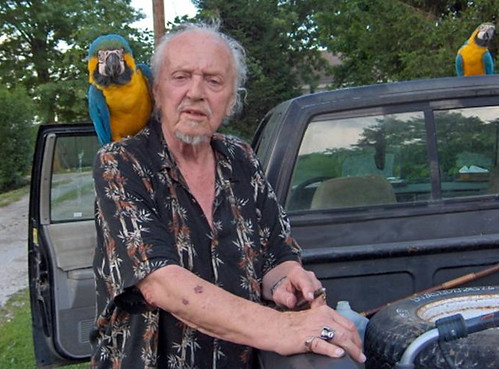 Del Nejmanowski poses with his parrots in 2006. Photograph courtesy of Patricia Nejmanowski CARLINVILLE — Del Nejmanowski loved animals. Through the years, he had doves, a hawk, a monkey — even a black bear — all of which he kept at home in Carlinville, opinions of neighbors notwithstanding. Eventually, he settled on macaw parrots. The big kind. The ones that rise early, squawk and, left to their own devices, do pretty much what they want.
Del Nejmanowski poses with his parrots in 2006. Photograph courtesy of Patricia Nejmanowski CARLINVILLE — Del Nejmanowski loved animals. Through the years, he had doves, a hawk, a monkey — even a black bear — all of which he kept at home in Carlinville, opinions of neighbors notwithstanding. Eventually, he settled on macaw parrots. The big kind. The ones that rise early, squawk and, left to their own devices, do pretty much what they want.
“See how all the rods are bent down?” said Jim Stinnett, pointing upward at rooftop television antennas around his house that look as if the world’s weight once rested upon them. “That’s from them landing on them.”
Nejmanowski died Aug. 27 at 83 — heart trouble, his daughter Patricia said. But his two parrots, all that remain of a flock that once numbered eight, are still at large. With winter approaching, Nejmanowski’s relatives are worried. That’s why they’ve set up an endowment fund for the birds. They say they need $11,000 to have them captured and shipped to a Los Angeles parrot sanctuary.
Stinnett and other neighbors say they won’t be making any donations, although they agree California is a good place for the birds.
“They were beautiful to look at, at first; they were a real novelty,” said Helen Kinser, who, like other neighbors, is tired of living in the middle of an Alfred Hitchcock movie. “We go to Florida, and there’s more birds here than there. You definitely know when they’re around because they squawk: ‘RAHHAWWRRKKK!! RAHHAWWRRKK!!’”
Besides making noise, neighbors say the birds, which must chew things to keep ever-growing beaks in check, have damaged roofs and gutters.
Not everyone considers the parrots a nuisance.
“Some people like them, and some people don’t,” said Mayor Bob Schwab, who had thought the parrots had gone away until he heard them squawking — loudly — Thursday evening. “It does add some color to the town.”
There is no disputing that Nejmanowski was an unusual man who made a fortune in the meatpacking business before falling on hard times. “Unique,” Schwab said. “Eccentric,” said Patricia, one of his nine children.
The bear Nejmanowski once kept in his backyard was about four feet tall, Stinnett recalled, adding, “It was more than a cub.”
Someone shot the bear, said Evelyn Nejmanowski, Del’s widow. The monkey was eventually given away. Then there were the roosters, chickens, cats and various animals in between.
Nejmanowski wasn’t fussy about names. He called his parrots Blue — Blue One, Blue Two, Blue Three and so on. And he didn’t believe in cages.
“The old cliche, the standard one: If you love something, set it free, if it loves you, it will come back to you,” said Patricia, breaking down in tears.
By that measure, Nejmanowski was definitely loved. Besides staying close to his home, the parrots would fly along with his pickup when he drove to Springfield or the McDonald’s in Carlinville.
Experts say parrots imprint on locations as well as people, which explains why they keep coming back to Nejmanowski’s old neighborhood, even though the house where he lived was bulldozed two years ago, forcing him to move in with a son.
Nejmanowski built a lean-to as shelter for the birds during winter, but since the house was demolished, the birds have made it on their own. No one is quite sure how or where. Evelyn said she thinks they’ve found a warm chimney.
Although parrots come from the tropics, they can adapt. In Chicago, a wild colony of Quaker parrots native to South America has established itself in Hyde Park.
“I know people who have birds in Alaska who leave them out until October,” said Lorin Lindner, president of the Association of Parrot CARE in Los Angeles, which runs the parrot sanctuary where Nejmanowski’s family wants to send his birds. “Our vet says that, easily, down to the 30s or even the 20s would not be a problem.”
But birds need more than warmth.
“The big thing is finding food,” said Talon Thornton, director of the Henson Robinson Zoo in Springfield. “I guess people in Carlinville have been putting food out for them.”
***
Want to help?
Del Nejmanowski’s family has set up an endowment fund for his parrots at Carlinville National Bank. Contributions should be made payable to The Association for Parrot Care and can be mailed to Carlinville National Bank, West Side Square, Carlinville, IL 62626.
***